On this page you can read the experience of participants from a variety of the activities and retreats that have been organised by SanghaSeva since 2004. If you have been on one of our retreats we would love to hear from you again please share your experience with us
Previously published on Medium as Can You Feel Me?
We have just spent a 3 day retreat in Calais, and although that may sound like a short time it was long enough to make me realise that there is so much I didn't know.
The situation is much worse in ways I had not imagined, and better in ways I was so pleased to see and hear about. A deeply touching and inspiring retreat; short and powerful.
One of the themes of the retreat was empathy. A refugee crisis is dependent on a conception of separation:"We are not the same, we are not equal; they don't have the same rights as me (to be where I inexplicably happen to be). (I don't know much about their situation, and haven't really made much effort to - I'm busy... - but will presume that) They could, and therefore should just go back 'home'."
Of course deep empathy does not suggest that we are the same, it doesn't insist on a feeling of separation either. Can we see what it is like to walk in these shoes? Worn and wet, probably a second-hand shoe I have had to take from a distribution round of donations.
If I were a refugee I would not be surprised to see my bedding has been sprayed by CS (tear) gas, poisoning the fibres and making it unusable once again. Another act to make me feel unwelcome, to give up and go 'home'. (Due to this common happening bedding last about 2 days in Calais.) And I may well be hardly surprised to once again see the humanitarian distribution vans arrive and by some miracle furnish me with clean bedding. (An amazing stalemate of generosity meeting unfriendliness.)
Am I welcome? Am I cared for? Am I respected? All humans have these doubts, but has it ever been this binary in your life?
Running from war, terror, & hardship into a camp with no camping. Then a group of volunteers come with hot food and clean clothes. Hardly meeting the inhabitants of the country just their harsh forces, and then these angels come, who also meet the wrath of the authorities, but keep on giving.
As I was volunteering in the warehouse I experienced a new way of looking: the refugees are the first inhabitants of the apocalypse.
How we care for them is an expression of how we feel we should be cared for when we arrive (eventually) in the same state. Do they deserve this becomes do I deserve this? How do I create an environment that I would be happy for my family to be met with?
From one perspective, if I know what is happening and do nothing I condone the cycle of violence. There is so much to open to, starting with this; one shade of the dark side of humanity. It feels immense, overwhelming, but is it? Have I actually tried to open to it, or do I just know it's too much without ever trying?
We can ignore (almost) anything in this life; climate change, our own death, terrible inequality, factory farming's mass cruelty, systemic racism and sexism, authoritarian violence, and a tragic migrant crisis. The main difference between
wisdom and ignorance is the size of the container.
So what can we do to enlarged the container in the face of a crisis?
Firstly see that there is support, and we're not the first to try; meditation, contemplation, sangha (community) all support and emphasise touching the difficult with love and wisdom.
We can open to this as it is happening.
Amazingly a lot of the difficulty in life is maintained by not looking. Just as we can feel that the avoidance of anything in life shrinks 'the container' and sense of what is possible, turning towards supports enlarging
the container. The larger we feel our capacity to be the less likely we are to feel it's overwhelming.
Once we become more familiar with this process, we get to see that all the terror in the world fits within the heart. It doesn't have to overwhelm; even though it sometimes will. This is not necessarily going to work or be easy, every
individual is different so sensitivity is needed. If we become overwhelmed we should seek helpful support and therapy.
This is but an outline of a surprising phenomena - referred to as sankhara Dukkha in the Buddhist teachings:
A great amount of the suffering we experience is caused by our relationship to the raw event. Sankhara Dukkha is where our self identity grows around the difficulty. Sometimes referred to as shooting the second arrow, it is an areas
in our life we can change, because it is caused by us. When we see this, we see a sign that reads: This way to happiness.
(If you're interested in this theme you can check out this talk Second Arrow Optional I gave recently, or just search for Second Arrow online for other voices.)
The main difference between an action of peace (and reconciliation) and anger (and violence) is the size of the heart space; larger the container, greater the range of options, more likelihood of a wise response, less chance of regret, doubt, and self-criticism - which all supports keeping the container large, and the journey continues.
In Buddhism there is a teaching called the Divine Abodes - these are mundane qualities taken to unfathomable heights; being friendly, caring, joyful, and peaceful. We know how to do these things, don't underestimate your potential to turn it up to 11.
Act and you will find that there is an amazing community already going, you are not alone. For in every darkness there are beings of light shining right into the darkest corners. That is true of Calais for sure. The beings of light you'll find, dancing, singing, doing the next right thing, right in the midst of the suffering are an inspiration for us all. Let's join them a while, learn the songs of peace, the movements of harmony, and be angels for change.
Deep bow, Nathan
Previously published on ClareCoyne.com as Calais: taking heart in hard times
Last week I was in Calais. We were a group of sixteen people who’d come together for three days to learn what was possible about the global refugee crisis and the current situation in the northern tip of France. On two of those days we went to the donations warehouse just outside Calais run by Help Refugees, and did what we could to contribute to the set up that greeted us.
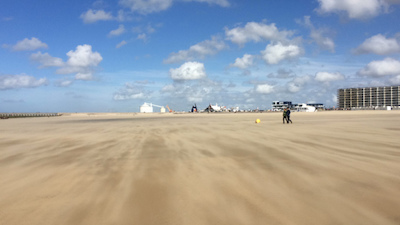
We found a warm, welcoming and dynamic place there, a place adorned with informative noticeboards and where numerous volunteers of all ages in yellow and orange high vis vests flow between tasks. There was a sense of lightness and fun, strongly underpinned by an attitude of focus, commitment and deep caring. Six organisations inhabit the space – a couple of warehouses and a large yard. As well as Help Refugees, there is: L’Auberge des Migrants, Refugee Community Kitchen, Utopia 56, Refugee Info Bus, Refugee Youth Service.
Both days we ate a lunch of curry and rice along with all the other volunteers, provided by Refugee Community Kitchen (RCK). Two and a half thousand meals are cooked on a daily basis by RCK, the majority being distributed at lunch and in the evening to the refugees in the areas of Calais and Dunkirk. Help Refugees estimate that there are currently between 800 – 1000 refugees sleeping rough in Calais and between 200 – 400 in Dunkirk.
The RCK meals are prepared by a bunch of short and long term volunteers. Most people learn on the job, guided by volunteers who may only have preceded them in the work by a short time. Yet the whole operation feels efficient and safe. The resulting food is tasty and preparation processes adhere to the rigorous standards of French health and safety. The satisfaction of eating the food is increased by the realisation that it is the same as that being eaten by people close by, in very different circumstances, and for whom a hot meal will likely make a critical difference to their day.
We were lucky enough to be given a tour of the warehouse by the current warehouse manager, Stu, on both the days we were there. It was a gift to hear him talk: Stu was passionate and realistic, compassionate and down to earth, focussed and with a sense of humour. He told us stories he had heard from people he’d worked with last year in the Jungle – the refugee camp of around 10, 000 people that was demolished by the French authorities last autumn – without sensationalism but with deep sensitivity. He decided to volunteer at Help Refugees after seeing the news at home and realising he couldn’t watch the refugee crisis from his sofa. He has been volunteering in Calais for many months since then. Stu was also clear about the humanitarian role of Help Refugees. There is no agenda to help refugees cross borders. The sole agenda is to help provide basic needs, the fundamental human rights of water, food and shelter; and to, hopefully, restore a little dignity in doing so.
Every day we were in Calais was bookended by meditation and punctuated by group discussion and sharing. Our group of sixteen had come together as a meditation-in-action group. Everyone attending the Humanity in Action SanghaSeva work retreat, which ran from 15th-18th August, is interested in how the practice of meditation and contemplation can support compassionate work. This in turn helps us understand the meaningful ways in which we are all connected.
Hearing how the refugees’ bedding often only lasts two or three days as it is routinely sprayed with teargas by the authorities shed a different light on my dry, warm, comfy bed back home. Learning about the widespread cases of trench foot among refugees meant that sorting shoes in the donations warehouse took on a sense of gravity, even while singing along to the music coming over the warehouse speakers. Listening to stories about the pressure that can be put on young men by their families to make long and dangerous journeys with the aim of supporting family back home helped me look at my own experiences of travel. I saw the personal choices I have made to leave home from a wider perspective.
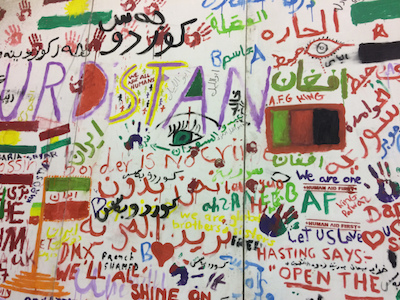
The connection and intimacy of our group, with the shared focus of meditation practice, provided a supportive, cohesive network. This helped hold the pain and confusion experienced from touching the edges of the refugee crisis. Being based in Calais, seeing the broad, sandy beach and the wide, deep sea, feeling the hot August sun, hearing the high winds, watching the torrential rain; being based in a place that feels geographically and emotionally at the extremity of things, where the ways to move on, to move forward, to move away feel tangible yet desperately distant; all these things helped develop, just a little, my awareness and my understanding. Stepping away from the known and towards the unknown, looking outwards together as well as inwards alone, I gained a little more aliveness and shed a little defensiveness.
We are all different and we are all the same. This is happening now. It is happening to them; it is happening to me; it is happening to us.
Clare Coyne
Alternatively you can read an edited version of this text with more photos at Yoga Trade published July 2017
I chose to work in the elderly home in the morning and alternating between the hearing and the visual impaired school in the afternoon. I wasn't aware of the internalized fear I was hosting around touching elderly people's bodies - it really had nothing to do with leprosy as I realize I also felt this sense of rejection at my grandmas retirement home. The look of fragility and potential weaknesses somehow gave me the impression of it not feeling safe to touch the bodies of these human beings. Maybe some unconscious fear of "catching" whatever they have (or my projection of their pain & their suffering) - (hmm turns out odds are as a human being if I'm super lucky, I will indeed catch the state of old age regardless of physical contact will people or not...ha).

My first day here, I started with offering hair combing and oiling as lice is a real problem here. The first lady I worked with, a woman named Girda-Bye, grabbed the comb from my hand and chattered off in Marathi (the local language) showing
me to comb much harder against her scalp! I was a little shocked but carried on. She laughed at me a lot and I must say I felt quite incompetent; some young white foreign chick, can't speak the language, cant even comb hair.
Free from lice but my head was full of self deprecating thoughts as I went on to attempt to offer her a (awkward) massage - simultaneously praying for my friends to miraculously pop into my existence to save these poor painful bodies
from being rubbed by silly & unexperienced "me". I felt I had nothing to offer where things desperately needed to be offered.

Arriving at the home the following day, the same woman, Girda-Bai came right into the courtyard and looked as though she was searching for me- she grabbed my wrist with her comb in the other hand and took me to her bed to do her hair. She was laughing a lot and kept yelling "Hoe! hoe! Hoeeee!" Which I learned means "yes" here, so I reckoned I was doing a better job.
The illusive walls between where the being behind 'their' skin and mine - are now fading. I realized that my intention is to share moments of connection, not "fix" anyone or anything. I've since been sharing the most precious exchanges of love.
They, like you and me and all other beings- simply want to experience happiness- feel love, less suffering, less pain. Something we can all naturally offer to each other - but as I can see it must start with the fragile being behind our own skin.
As my unhelpful storyline of incompetence dimmed down- I've been able to share in some of my most valued activities - of cuddling, singing and listening to foreign languages and displaying with my face & head gestures that I totally understand- (which I somehow feel that I do).
Massaging is becoming much more natural to me and we have progressed to doing in-bed yoga for joint mobilization.
Baba (one of the founders ) was known to say that the real leprosy to fear is this leprosy of the mind.
These human beings are so special. Maybe it really is the challenges that strengthen the spirit. All I know is the light and love radiating from these beings feels so bright that I can't even see the different abilities, shapes of bodies or sense capabilities in all their various forms.
I feel it's a great opportunity to open into the space beyond the discernment of our mind that constantly creates distinctions between good, bad, less or more, like or dislike and see into this thread of being present to life- exactly as it is.
"Namaste"- they say here with their hands at their heart and I couldn't imagine a greeting that was more appropriate. I see you- as a pure divine living, breathing, feeling being- as significant a life as the one I consider "my own."
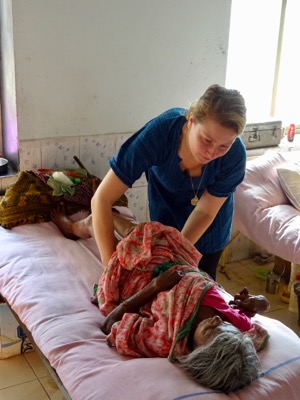
May we all find ways of abiding with love and opening into our natural state of inner and outer harmony.
With love Sacha
Previously published on WildWiseQuest.wordpress.com
Quand j’ai annoncé à mon frère que pendant un mois j’allais faire une retraite de méditation & volontariat dans une lèproserie en Inde, il m’a répondu, enthousiaste:
« ah oui c’est une bonne idée, ça sonne un peu comme crêperie. »
Et ça m’avait fait rire.
Mais en arrivant ici, pour être honnête, j’ai vite réalisé que ça n’allait pas être de la tarte. Ni de la crêpe.
Je me croyais suffisamment courageuse et remplie de compassion pour dépasser mes peurs et…mon dégoût.
Mais ça c’était avant de me retrouver nez à nez avec la lèpre. Quoi que parfois y avait même pas de nez.
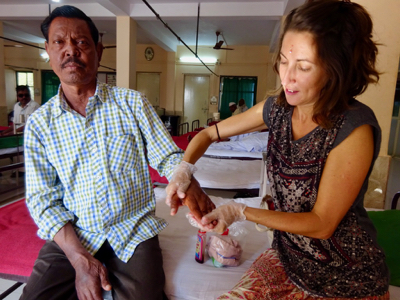
Une communauté de 2000 personnes, réunies ici parce que rejetées par le reste de la société indienne.
Déformités, plaies, amputations, saleté, pauvreté…À la vue des afflictions dont souffrent les gens ici, il faut avoir le
coeur et l’estomac bien accroché. Ce qui n’est pas mon cas. « Urgences » à côté c’est un film pour enfants…et ça avait déjà le don de me faire tourner de l’œil. Alors pu…*#*
qu’est ce qui m’a pris de venir ici ?!!!
Depuis mon arrivée donc, tout mon être dit non. Non. Non. Non. Mère Theresa sors de ce corps. Et retourne donc te dorer la pilule à Goa. Ça tu sais faire. Et t’es même plus douée que la moyenne. Ya des gens qui ont comme vocation d’aider les autres. Laisse-les gérer et barre-toi illico-presto.
Bref, les premiers jours, j’ai refusé l’obstacle.
Et puis…
Voilà de quoi il s’agit ici.
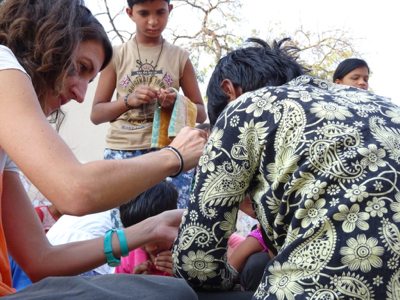
Baba Amte, le fondateur de cette époustouflante communauté il y a 60 ans, ami de Gandhi, du Dalai-Lama et autres sages, savait que la maladie la plus pernicieuse se trouve dans nos cœurs et dans nos têtes. Peu importe que nous ayons encore nos 2 jambes, nos 2 yeux et nos 2 bras. Nous n’en sommes pas moins handicapés de la vie…et au fond de nous, nous le savons.
Je ne suis pas dupe, la principale raison pour laquelle je suis venue faire du volontariat ici est assez égoïste. Marre de ruminer mes névroses d’enfant gâtée. C’est vrai, moi aussi j’ai la lèpre. Mon esprit est rongé par la peur, la colère, la culpabilité, l’indifférence…Et cette lèpre là ne se guérit pas en 6 mois avec un bon médecin et quelques pilules. Mes psy et profs de méditation en sont témoins, je suis une patiente récidiviste 🙂
Alors oui, les premiers jours, j étais ulcérée par ce que je voyais autour de moi. On rencontre ici un niveau de souffrance dont le fait d être née nantie en France m avait jusque là épargné. Et pourtant à y regarder de plus près, il y
a dans cette communauté de lépreux plus de joie et d’harmonie que dans mon esprit encore si souvent torturé.
Soyons sincère: je ne sais plus qui aide qui. Ces blessés de la vie, exclus, défigurés, amputés, voire maudits,
me donnent ma leçon tous les matins. Je me sens presque prétentieuse d’avoir pensé que j’allais les aider. Ce fameux syndrome du sauveur…remisé au placard 🙂
Ma « mission » ici, s’il y en a une, c’est simplement de partager un bout de chemin, assez unique, avec d’autres êtres humains. En frères de lèpre que nous sommes.
Je reçois beaucoup. D’affection. De joie. D’enseignements.
J’offre ce que je peux. A l’hôpital. A l’école ou à l orchestre.Mon temps. Mon énergie….Mes mains pour un massage sur des genoux déformés.
Mes bras pour une course en fauteuil roulant. Un chai. Un sourire. Un morceau de chopin au piano. Une blague pourrie. Ma patience quand je n’ en ai plus. Un samossa pour le chien qui pèle. Une chanson de Francis Cabrel (oui oui)
entre 2 musiques de Bollywood. Un câlin. Plein. Des gommettes. Quelques mots d’Hindi avec mon plus bel accent français.
Parfois juste un regard, qui dit je te vois.
Souvent, ça suffit.
Et guess what, c est gratuit et ça guérit bien la lèpre de l’esprit 😉
Tu connais ce moment chez le coiffeur, où tu te regardes dans le miroir, tu vois tes longues boucles qui se font tailler sans ménagement, tu es là pour ça by the way, mais c est plus fort que toi, tu commences à stresser. « What the F*# !? ? Je lui avais dit court mais pas SI court !!!Il est taré,ce coiffeur, il veut me défigurer ou quoi ? Ça va mettre des semaines avant de repousser !! Autant annuler direct ma date avec Jérémy, hors de question qu’il me voit comme ça…Oh mes cheveux partout sur le sol, c’est un carnage. Ces coiffeurs qui n’écoutent pas ce qu’on leur demande, toujours pareil… »
Ton estomac est crispé, tu boues intérieurement. Bien sûr tu ne dis rien au coiffeur, c est trop tard. Autant qu’il finisse aussi vite que possible sa sale besogne. Mais tu lui en veux, de te faire te sentir si vulnérable, à sa merci. Droit de vie ou de mort sur ton image. Rien que ça. Ça frôle le crime contre la beauté.
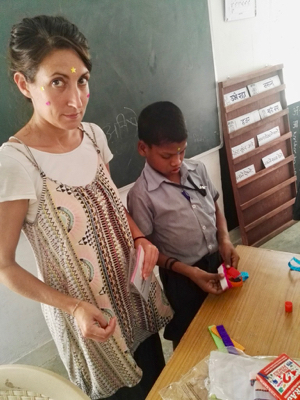
Et puis 20 interminables minutes plus tard, il vient de terminer, tu te regardes à nouveau dans le miroir, devant derrière à droite à gauche. Tu lèves les yeux vers lui, un brin insatisfaite, et tu t’entends lui dire : ‘vous pourriez couper un tout petit peu plus court ? Là ça me change pas assez de tête.’
Et bien me voilà. Crispée. Dans un salon de coiffure ultra-tendance de Bombay. Une semaine à peine après être sortie de ma retraite dans une communauté de lépreux. J’avais envie de m’offrir un petit moment de luxe. Et soudain, en me regardant dans ce miroir pour vérifier que je suis pas trop moche, la joyeuse absurdité de la situation me saute aux yeux. Le contraste, détonnant, avec ce que je viens de vivre pendant 1 mois. La rapidité avec laquelle l’ego reprend le dessus, en accord avec notre société qui mise tant sur l’apparence, l’image, le Moi-Je-Mon-Mien.
Et je repense à cette retraite que je viens de vivre et qui a bouleversé l’idée que je me faisais de ce MOI que je tiens tant à protéger des méfaits du coiffeur.
Là bas pendant 1 mois, je n’ ai été PERSONNE. Et tu sais quoi, ça m’a plu. Parce que ces gens ne parlaient pas un mot d anglais et moi pas un mot d hindi, personne à qui raconter MA petite histoire. Là bas les gens ne connaissaient ni mon nom, ni mon âge, ni mon passé, ni les raisons pour lesquelles j’étais là. On s’en foutait, en fait.
Certains étaient aveugles et ne voyaient même pas mon visage. Ma coupe de cheveux ratée ne les aurait pas émus. D’autres étaient sourds et n’ont jamais entendu le son de ma voix. Ce qui ne nous a certainement pas empêché de communiquer. D’ être en lien, d’humain à humain, sans blabla, sans l image ni le son. Se moquer d être beau ou moche, bien-portant ou lépreux. Du moment qu’on peut mutuellement se réchauffer à la simple présence d’un autre être humain.
Et puis s’oublier un peu. Oui pour un instant, oublie-toi, et le ciel t aidera. Voilà une de mes leçons préférées pendant cette retraite. Je me rends compte qu’avec la méditation, on passe un temps fou à essayer de mieux se connaître, traiter nos névroses sur le coussin est un job très prenant. Tant et si bien qu’on pourrait par mégarde en oublier le monde extérieur et devenir très auto-centré. Ce qui n’est pas le but. Toutes ces heures de méditation n’ont un sens que si elles nous permettent de mieux être au monde, et non à distance.
C’ est du moins mon avis.
Je réalise maintenant pourquoi certains deviennent addict aux missions humanitaires et sociales en tout genre. Il y a dans le don et l’aide à l autre, un oubli de soi absolument jouissif. Tout à coup, la coupe de cheveux ratée, et autres micro drames de nos quotidiens, perdent de leur intensité. Quelque chose de plus grand est à l’œuvre, quelque chose qui enfin fait sens, l’impression d’être au service de la vie. Et ce sentiment là, aucun salon de coiffure ultra-tendance qui promet amour gloire et beauté ne pourra jamais l’offrir.
PS : Pour ceux qui compatissent et s’inquiètent de ma nouvelle coupe de cheveux au sortir d un coiffeur indien ( non mais qu’elle idée??)… c’est pas si pire 😉
Marianne Leenart
Poem to process opening to the occupation.
I am a soldier deployed on an occupied land,
With deadly weapons
And heavy armor,
I am the shape of fear.
I am the patrol amongst the olives,
I am the midnight soldier knocking on the door,
I am the intervention force pursuing shooters,
I am the post of segregation in the middle of the 'haunted town',
Programmed to
react to threats,
I cannot see the goodness crushed beneath my heavy boots.
Call me by my true names... I am the shooter, just shot the lady dead,
I am full of rage and anger, I want to hurt "them" back,
All I see is "them", I cannot see the wife, the mom, and grandma heading home,
Call me by my true names...
I am the farmer, following my ancestors olive trees.
There, beneath my olives, on my own land,
I am humiliated time after time,
They took my land, they took my water,
My mind
is clouded grey, I can barely see the beauty of this life.
Call me by my true names...
I am the lady, living on forbidden promised land,
Two thousands years, I have come back, I claim it
In the name of God and persecutions,
My eyes are closed my heart is heavy,
I
cannot see them suffering from my return,
Call me by my true names...
Tomer Saad
the patter of english raindrops
as olives fall on black tarpaulin
in palestine
in a grove
near a village
near a settlement;
- a sound from home,
in a place far from home
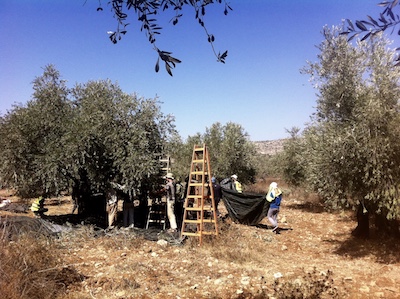
that is beginning to feel
like home.
the dust and heat rise,
cover my body outside,
fill my heart inside.
now and then a donkey brays,
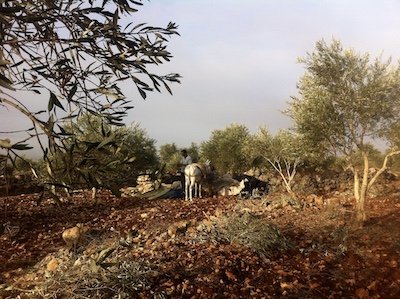
now and then we stop for sweet
tea made on a fire of dry sticks.
we move from tree to tree.
conversation ignites, dies down;
arabic hebrew english.
inside, the rain continues to fall
long after I have left
and the harvesting done.
Clare Coyne
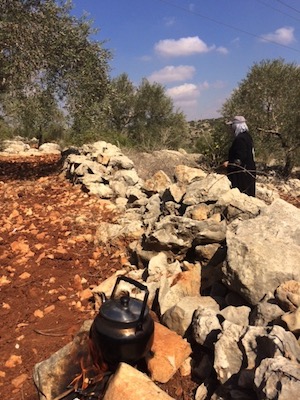
Towards the end of the Being Peace retreat this year we went on a tour of Hebron, the largest city in the West Bank, and often described as the most violent place of the Palestinian-Israeli conflict. Our guide was an Israeli ex-soldier who had chosen to volunteer with Breaking the Silence, which describes itself as 'an organization of veteran combatants who have served in the Israeli military since the start of the Second Intifada and have taken it upon themselves to expose the Israeli public to the reality of everyday life in the Occupied Territories’.
After driving for about an hour and a half from Tel Aviv we stopped at the edge of Hebron. We all got off the bus, and followed our guide to a vantage point from where we could see a Jewish settlement cheek-by-jowl with a Palestinian neighbourhood. I took a photo to help me explain the proximity to people back home, although it was hard to capture with my phone camera. The guide pointed out the features that distinguished the two areas of housing. Palestinians typically have black water tanks on the roofs of their houses, while Israeli houses most often have white electricity boilers on top.
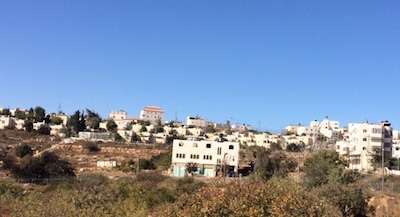
The guide explained that, due to water restrictions imposed by Israel as a result of the military occupation, Palestinians conserve water in the black tanks so they have a reserve supply for the ‘dry’ periods. A man interrupted the guide as he described this. He said that he had visited an Israeli settlement recently, and that people there were also experiencing water shortages. He demanded that a fair, accurate and balanced picture be portrayed. There seemed no doubt that he felt an overtly pro-Palestinian take on things was not a true version.
I wasn’t clear about the origins of the man’s argument, but I do feel clear that both Israelis and Palestinians continue to suffer every day, in similar and different ways, as a result of the conflict. The guide and other people in the group responded to the man's interjection, calmly stating his point was misleading, and suggesting it was very likely not correct; not true. Their response fitted with my version of the truth since the water restrictions that Palestinians contend with are well documented (see here for just one example). Furthermore, I have never heard of the Israeli settlements experiencing water shortages for any length of time, and the state of vegetation in and around any settlements that I've seen seems to support this.
But I was left thinking about truth, and also about fear, and the connection between them. I know that for me there are times when I find it soothing to create a particular narrative so that I can avoid seeing another version – another version where, perhaps, I’m not as much in control as I’d like to think I am. It could be something apparently minor or benign like, ‘I didn’t get lost, I just took a wrong turning’. This interpretation may serve to protect me from another reality which, at heart, equates to, ‘I’m not perfect / I’m not in control’. From there the ultimate truth is then very close to the surface, ‘I’m mortal; I will die’, and with it the reality of my existential anxiety.
Earlier in the Being Peace retreat we’d met an Israeli settler. He talked to us at length about the history of the land where we all were. He went back several thousand years, giving a context to why he felt he had a right to be in there, living in a settlement that the United Nations has declared illegal, and explaining why he thought Palestinians didn’t have that right. At points his voice became raised, at other points he was laughing loudly as he spoke. I was interested to notice the compassion I felt for him, and also for his wife who was sitting beside him looking at him with love and concern for his agitated state. It was only after our meeting had finished that we heard a little about how and when he came to be in Israel: he had arrived from Germany as a baby in 1946.
Although I felt I could understand the worldview the settler has taken, especially given what we understood about his early life, I dearly wished it was otherwise. My felt sense and my reason told me he had lived his life through a prism of fear. And I felt I could see how life choices rooted in fear lead only one way, to suffering, and in this particular context, to trauma, for both Israelis and Palestinians. The fear is manifest in these communities in bricks and cement and roads and schools and houses and hospitals and factories and check points and bombings and stabbings and wars and water tanks. It is a fear which ends up locking people in, even as the aim is to lock others out.
The Being Peace retreat ended, and I found myself back at Tel Aviv's Ben Gurion Airport waiting for my return flight to the UK. I noticed several water fountains. It was easy to refill my bottle both before I checked in, and in the departure lounge. I couldn’t help but be curious about this. Since 9/11 my experience is that airports and retailers have taken full advantage of tightened security regarding fluids, and that water is now rarely freely available. It felt good to have the choice to drink as much water as I wanted, and to not have to pay an inflated price to do so. But what also came to mind were the black tanks we saw on top of the Palestinian houses in Hebron. I wondered about the airport's water fountains, and whether providing them was a thought-out strategy, aimed at giving visitors the impression this was a humane, generous country where basic rights are met without question.
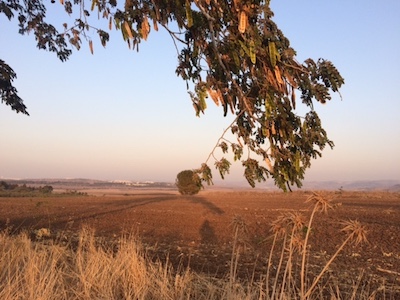
I tried to check myself with this thought process. It seemed cynical at best, dark at worst. I don’t know the truth but I tried to draw a little comfort from thinking that just as the truth changes, and is different for different people, so do situations change, and in actuality, not just in perception: ‘things changed in South Africa, they can change here’, was my line of thought. In relation to the Palestine-Israel conflict, my wholehearted hope is for wholesome change, resulting in improved circumstances for all, where plentiful life choices and decent living standards can be enjoyed equally by everyone.
Of course hope is not enough. Recently I came across an article that explored how Buddhist principles for transforming how we live individually can reshape public life on a structural level. I didn't find all of the article easy reading, but a phrase jumped out that I keep coming back to. The writer described a way of being on an individual level that inevitably influences the world around us, leading eventually to 'a public actualization of [our] own innate wisdom'.
I like the clear reference to the fact that every one of us is innately wise; it can be easy to forget this in challenging times. And I wonder if the surest way of tapping in to this deep wisdom is through clinging less on a personal level to our own version of the truth. If we let go more, then we’re better placed to take courageous, collective action based on our deepest aspirations as beings all looking for happiness, and longing for peace.
Clare Coyne